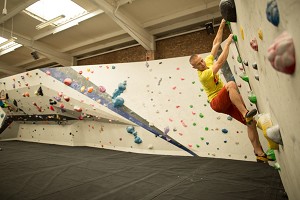
In this article series I Want That Job! I'm interviewing people from various professions within the climbing world. If you think your job is a dream come true (it has to be climbing related) and if you're willing to be interviewed - then drop me a line. Likewise if you can think of a job that you'd like to have - suggest it in the forums and I'll try and track someone down.
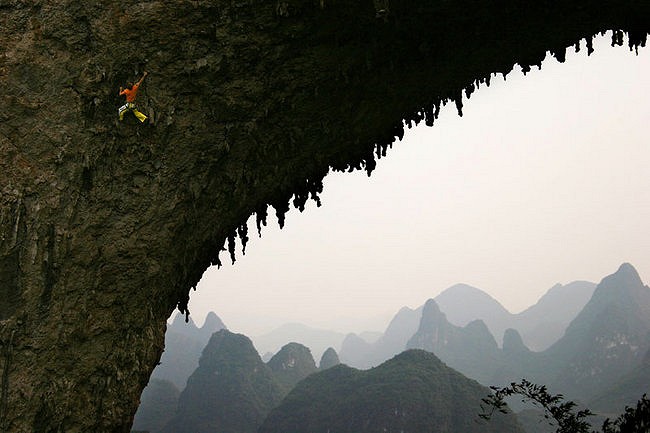
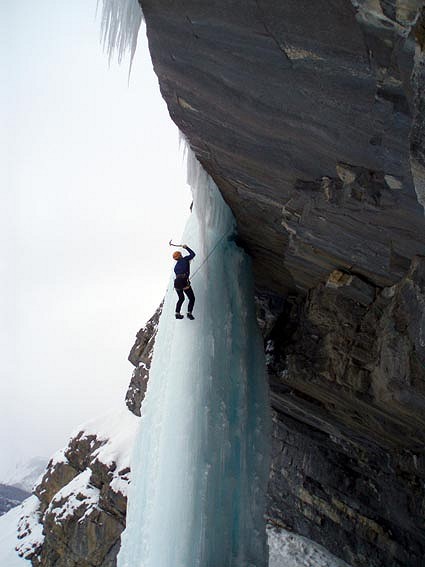
Name: Neil Gresham
Age: 36
Job Title: Professional climber and coach
Relevant Qualifications: E10, F8b+, 15 years writing articles for climbing magazines worldwide and 10 years of practical coaching experience
Salary: Depends how much coaching I do.
Describe your job:
I am a professional climber and coach, which means that most of my time is occupied by something or other to do with climbing. The hard part is trying to get a break from it all! As well as the climbing part, I also do a total of 70 days of promo work for my sponsors who are Mountain Hardwear, Black Diamond, La Sportiva and Beal. This can involve anything from slide-shows and demo events at walls, to trade shows or product training in outdoor shops. I also submit regular product reports and help with the design and testing of new kit. There is a surprising amount of desk work to do in terms of writing articles, editing pictures and video footage, updating blogs and so on. The coaching is something that I am putting more and more time and effort into these days. I have over 30 clients for 1:1 sessions in London and I also travel to do Masterclass workshops and sessions with the British team. I also run coaching holidays to Fontainebleau and Kalymnos and a course for aspirant coaches at the Westway in London. In addition to this I run a personalised training programme service over the internet (see www.climbingmasterclass.com) and write training columns for Climber and Rock & Ice.
Perks and holidays/time off:
If climbing trips count as holidays then I try to do 3 or 4 rock trips abroad per year and 2 ice trips. Some of these are picked at whim according to where I fancy going and others will have some professional value (like a hard route or an unusual destination). I don't tend to go away for longer than a fortnight at a time because I end up with too much coaching and admin to catch up on afterwards. It's a myth that sponsored climbers get their trips paid for. I get a flat salary, most of which has to be spent on climbing trips, otherwise I would lose my job! I'm certainly not complaining here, but there's not much left in the pot at the end of the year, and hence I supplement my sponsorship salary with coaching work.
How did you get this job? How long did it take? Any hardships? Did you always want it or did it just happen?
I had always dreamt of being a pro climber as a teenager. The obvious concern was that I wouldn't be good enough, although it was difficult to ascertain exactly what the required standard was or how one actually went about getting sponsored. Fawcett and Moffatt had been childhood heroes and it was impossible to imagine coming close to their achievements. Nonetheless, I felt I should give it my best shot, so I went on the dole after finishing Uni in Sheffield in 1991 and trained as hard as I could in the cellar. I managed a handful of 8bs in the UK and abroad during the big sport climbing boom in the early 90s, but it was evident that I would never make the cut as a sport climber, so I threw in the towel and got a job as a Sales Rep for DMM, who were giving me a bit of kit at the time. At this point I decided I needed to try something new and forget about the whole sponsorship thing, so I switched to headpointing. I had always vowed that I would take a look at one of the big British trad routes like Indian Face before I died. Little did I know that it would actually be Indian Face and little did I know that I would nearly die trying! I ended up making the third ascent and it was odd that my first major sponsorship deal came after the first hard route that I had genuinely climbed 100% for myself. Mountain Hardwear and La Sportiva both offered me contracts in 1999, but things didn't work out with DMM so I moved to Black Diamond and haven't looked back since. I am very lucky to be with companies that make exceptionally good stuff otherwise I'm sure I would feel pretty fake trying to endorse it. It's easy to say that you can use any kit if you get paid to do so, but if you actually think about the consequences of having the wrong shoes on a grit E10 or the wrong ice axes on a WI 7 then a different picture starts to emerge.
The coaching thing was something completely different that ran concurrently to all this. One of the guys who influenced me a lot during the Sheffield cellar era was the original 'training guru' Matt Smith. Between the two of us, we must have ploughed through a library of training texts and journals and I often wonder why we never applied to do a sports science degree. I started writing training articles for OTE in '92 and moved to High magazine around '94, then Climber in '98. Around this time a few people contacted me for some 1:1 sessions and training programmes and it all grew from there. One of the main reasons I live in London now is because it is the best place for me to develop my coaching work.
Describe your average day at work? And the average week?
There is no average day, it depends on whether I'm on a climbing trip, doing promo work, coaching or doing office stuff.
Is it how you/other people imagine it to be?
One thing is for sure, I don't get paid just to go climbing and I'm pretty sure that no one does in the UK any more. The closest to this ideal would be Leo or Steve Mac but even these guys are contracted to do a certain number of days of promo work for their sponsors. The last 'truly professional' climbers in the UK were Ben and Jerry (there is a rumour that Moffatt has never done a day's 'conventional' work in his life!) and the main reason Rich Simpson gave up climbing is because his sponsors wouldn't pay him just to climb. It's a real shame but there simply isn't enough money in the industry and the only way a sponsor can justify an association with a climber, no matter how good they are, is if they are prepared to get out there and meet & greet. The way I see it is that this work can be a fun part of the job if you make it so, and more importantly it takes away the pressure of having to deliver on the crags. I know for a fact that I'd go to pieces if my mortgage depended on me delivering an E10 each year!
The best day? The worst day?
The worst days are trade shows. I used to love these when I was younger but now they're such a drag. There is always the same old hype about the end of show party, and they are always embarrassingly rubbish. The computer work can easily get out of hand too - The other day I was asked to update my blog and I realised that I'd been doing so much desk work that there was little to say. The best parts are too numerous to mention, so I have to tell the most recent tale of camping on the same beach as a herd of seals on the isle of Mingulay and then doing one of the best E4s I can remember with a good pal whilst a whale bobbed around in the sea just below. On the way home, our yacht was escorted by a school of Dolphins for over half an hour, which was the icing on the cake. (See Neil's article 'The Mad Mingulayans' on UKC)
Why is it great being a professional climber and why is it rubbish?
I would have thought that the good parts were pretty obvious and I don't wish to gloat. The rubbish part is worrying it's all going to come to an end and having to re-negotiate your contracts. In the early days I used to worry more about my own climbing performance but now I realise that the greatest concerns are changes of supply and distribution creating a 'brand clash' (for example, your rock shoe brand moving to the company that sells a rival hardware brand) It's really important to keep your eye on changes within the industry so you can stay ahead of the game. I guess now that I am coaching I worry a lot less about all this, as I could easily develop that into a full time career. On a similar note I also have a phobia of becoming 'the oldest swinger on rock' and I hope I'm able to spot the point to hang up my rock shoes and switch to a zimmer frame! Again with coaching this ought to be a little easier to do.
If a teenager said to you 'I want to be a sponsored climber, like you' – what would you say?
I have helped a few youngsters along the way such as Leah Crane and Kitty Wallace, so I guess I am all in favour of this path for those who are sufficiently passionate about their climbing. You may not even need to be supremely talented if you are prepared to work incredibly hard. Sometimes the good guys are prone to sitting on their arses and you can get a 'hare-&-tortoise' scenario when the grafters come through late. This was certainly what happened to me as I was pretty average at climbing for ages. I guess the crunch is that a youngster is under no delusions about what's involved and they realise that you have to be commercially minded as well as a good climber. If you are thinking in terms of what you can do for your sponsors rather than asking what they'll do for you then you are on the right lines.
Any tips and advice on how to get to where you've got to?
The important thing to realise is that it is not all about how hard you crank. It is just as important to be able to talk and write about your experiences. Better still, if you are good with the internet and multimedia you can become a 'virtual climber' and do it all from your computer without ever needing to see a crag! Joking aside, I can't stress enough how important these other skills are.
The other thing is that you shouldn't focus on getting sponsored to the point that it starts to jeopardise your love of climbing. It is easy to become cynical or over-competitive and it's important to stay clear of all the bitchiness (especially on the chat forums) and to stay focussed on your own game rather than worrying about what others are doing. A sense of context for your achievements is also pretty useful. There are quite a few youngsters who think the world owes them a living because they can do the blue holds problem at their local wall, but it's so much more important to be able to travel and climb well at a variety of different styles. I guess I have become a jack-of-all-trades purely because I could never have been a master at one, so if you're going to focus on one style then you'd better be pretty good – especially if it's bouldering, sport climbing, or worse still, competitions. I say this because these are the toughest disciplines to excel in and they are also the least commercially viable to sponsors in the UK. Strangely, it is the manufacturers of Gore-tex clothing who pay the rent for pro climbers, not the climbing hardware or shoe manufacturers and indoor climbing and bouldering have limited appeal to these companies. I'm not saying that you should sell out and pick up a pair of ice axes to justify your worth to your sponsors, although this is exactly what some of the top Euro comp climbers did a few years back! The cool thing is that they really started enjoying the ice, so I see nothing wrong with that.
I guess a final point is to have a contingency plan for the point where the elbows start packing in. With coaching I guess I've got something pretty concrete to turn to but it could be a bit bleak if you didn't go to Uni and all you did for twenty years was climb. I guess there are opportunities with route setting but I'm not sure I'd want to do that if I was in my 50s!
Any friends through work?
Too many to mention. It's friends outside work that I need more of!
Any amazing stories?
I'd like to think I have a few. Have a browse at the book I put together with Tim Emmett, 'Preposterous Tales' and judge for yourself.
And finally - What's your dream job? Why?
This one could easily be. I need to work at making it a bit less hectic and doing a little more climbing though. The balance isn't quite right at the moment and I'm spending far too much time at the wall and at my desk. Overall, it's not that well paid but who cares!
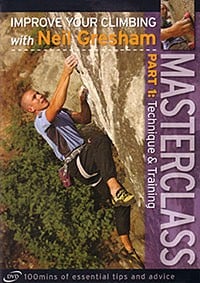
Thanks to Neil for taking the time to be interviewed and thanks to all the photo contributors.
For more I Want That Job! Articles take a look here:
- I Want That Job! Kate Burke - Editor, Climber Magazine
- I Want That Job! Chris Craggs - Guidebook Writer
- I Want That Job! Simon Panton - Guidebook Publisher
- I Want That Job! Dave MacLeod - Professional Climber
- I Want That Job! - Pauline Sanderson - Glenmore Lodge
- I Want That Job! - Lucy Ham - Sales and Marketing: prAna
- I Want That Job! - Sam Whittaker - Climbing Wall Owner
- I want that Job! - Martin Kocsis - Volunteers' Officer at the BMC
- I Want That Job! - Jim Nichols, Director, Entre-Prises
- I Want That Job! - Brendan Kendell - Desert Explorer
- I Want That Job! - Andi Turner - Instructor and Teacher
- I Want That Job! - Maurizio Oviglia, International Climbing Journalist
- I Want That Job! - Tom Randall, Professional Route Setter
- I Want That Job! - Tim Neill, Plas y Brenin




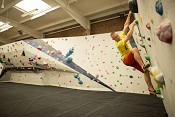
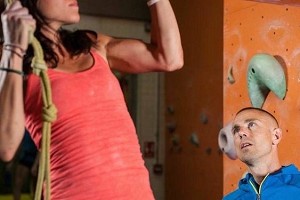
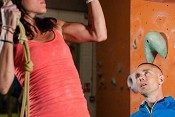
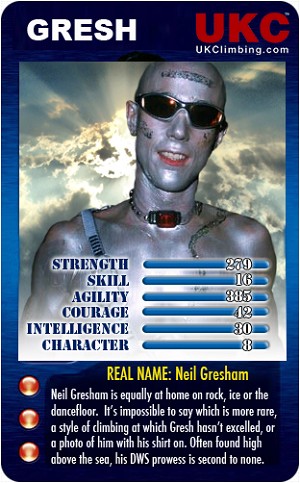
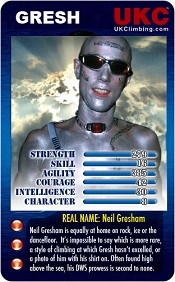









Comments